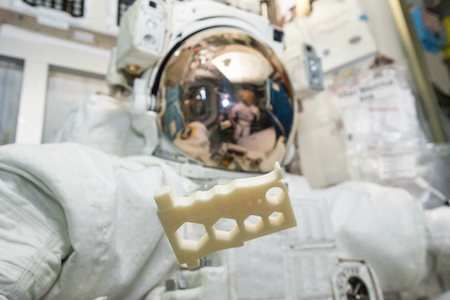Science Fiction
Dictionary
A B C D E F G H I J K L M N O P Q R S T U V W X Y Z
Study Reveals Effect Of Space Travel On The Brain

The research, published today in the journal Scientific Reports, involved imaging the brains of 15 astronauts before and after extended tours of duty on the International Space Station.

(Astronauts make space tools on board the ISS)
Researchers used magnetic resonance imaging to measure perivascular space—or the space around blood vessels—in the brains of astronauts prior to their launch and again immediately after their return...Comparing before and after images, they found an increase in the perivascular spaces within the brains of first-time astronauts, but no difference among astronauts who previously served aboard the space station orbiting earth.
"Experienced astronauts may have reached some kind of homeostasis," Piantino said.
The perivascular spaces measured in the brain amount to the underlying "hardware" of the glymphatic system. Enlargement of these spaces occurs in aging, and also has been associated with the development of dementia.
(Via PhysOrg.)
The first science fiction author (or anyone, as far as I know) to use the expression space-sick was Hugo Gernsback in his classic 1911 novel Ralph 124c 41 +; he expanded on his idea in the 1929 edition of his book:
Ralph grew more despondent each day, and his hope of bringing his betrothed back to life grew dimmer and dimmer as the hours rolled on. For the first time since he left the Earth he became space-sick.Space-sickness is one of the most unpleasant sensations that a human being can experience. Not all are subject to it, and it does not last longer than forty-eight hours, after which it never recurs. On Earth, gravitational action to a certain degree exerts a certain pull on the brain. Out in space, with its practically no gravitational action, this pull ceases. When this happens, the brain is no longer subjected to the accustomed pull, and it expands slightly in all directions, just as a balloon loses its pear shape and becomes round when an aeronaut cuts loose, to drop down with his parachute.
The effect on the brain results in space-sickness, the first symptoms being violent melancholy and depression followed by a terrible and heart-rending longing for Earth.
Compare to space madness from A Daring Trip to Mars (1931) by Max Valier, moon-terror from Star of Dreams (1941) by Jack Williamson, gravitation paralysis from The World With A Thousand Moons (1942) by Edmond Hamilton, Space Scurvy (Kenoalgia) from Sacred Martian Pig (1949) by Margaret Saint Clair and space phobia from Let 'em Breathe Space! (1953) by Lester del Rey.
You might well ask Are You Ready For Commercial Space Travel?
Scroll down for more stories in the same category. (Story submitted 7/7/2022)
Follow this kind of news @Technovelgy.| Email | RSS | Blog It | Stumble | del.icio.us | Digg | Reddit |
Would
you like to contribute a story tip?
It's easy:
Get the URL of the story, and the related sf author, and add
it here.
Comment/Join discussion ( 0 )
Related News Stories - (" Space Tech ")
The New Habitable Zones Include Asimov's Ribbon Worlds
'...there's a narrow belt where the climate is moderate.' - Harl Vincent, 1931.
Will Space Stations Have Large Interior Spaces Again?
'They filed clumsily into the battleroom, like children in a swimming pool for the first time, clinging to the handholds along the side.' - Orson Scott Card, 1985.
Reflect Orbital Offers 'Sunlight on Demand' And Light Pollution
'I don't have to tell you about the seven two-mile-diameter orbital mirrors...'
Chrysalis Generation Ship to Alpha Centauri
'This was their world, their planet —
this swift-traveling, yet seemingly moveless vessel.' - Nat Schachner, 1934
Technovelgy (that's tech-novel-gee!) is devoted to the creative science inventions and ideas of sf authors. Look for the Invention Category that interests you, the Glossary, the Invention Timeline, or see what's New.
Science Fiction
Timeline
1600-1899
1900-1939
1940's 1950's
1960's 1970's
1980's 1990's
2000's 2010's
Current News
The New Habitable Zones Include Asimov's Ribbon Worlds
'...there's a narrow belt where the climate is moderate.'
Can One Robot Do Many Tasks?
'... with the Master-operator all you have to do is push one! A remarkable achievement!'
Atlas Robot Makes Uncomfortable Movements
'Not like me. A T-1000, advanced prototype. A mimetic poly-alloy. Liquid metal.'
Boring Company Drills Asimov's Single Vehicle Tunnels
'It was riddled with holes that were the mouths of tunnels.'
Humanoid Robots Tickle The Ivories
'The massive feet working the pedals, arms and hands flashing and glinting...'
A Remarkable Coincidence
'There is a philosophical problem of some difficulty here...'
Cortex 1 - Today A Warehouse, Tomorrow A Calculator Planet
'There were cubic miles of it, and it glistened like a silvery Christmas tree...'
Perching Ambush Drones
'On the chest of drawers something was perched.'
Leader-Follower Autonomous Vehicle Technology
'Jason had been guiding the caravan of cars as usual...'
Golf Ball Test Robot Wears Them Out
"The robot solemnly hit a ball against the wall, picked it up and teed it, hit it again, over and again...'
Boring Company Vegas Loop Like Asimov Said
'There was a wall ahead... It was riddled with holes that were the mouths of tunnels.'
Rigid Metallic Clothing From Science Fiction To You
'...support the interior human structure against Jupiter’s pull.'
Is The Seattle Ultrasonics C-200 A Heinlein Vibroblade?
'It ain't a vibroblade. It's steel. Messy.'
Roborock Saros Z70 Is A Robot Vacuum With An Arm
'Anything larger than a BB shot it picked up and placed in a tray...'
A Beautiful Visualization Of Compact Food
'The German chemists have discovered how to supply the needed elements in compact, undiluted form...'
Bone-Building Drug Evenity Approved
'Compounds devised by the biochemists for the rapid building of bone...'
